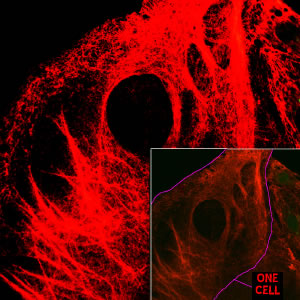By Ben Fuchs | Pharmacist Ben
Athletes take note: Vitamin A can improve performance and provide tremendous benefits because it helps increase protein synthesis from muscle cells. This means Vitamin A is one of the most important nutritional supplements for weight lifters and body builder and anyone interested in improving athletic performance. And you don’t have to be pumping iron or running a marathon to benefit; the increased protein synthesis cans also improve vitality and energy and day to day strength for sedentary couch potatoes too.

By Martin Doege (Own work), via Wikimedia Commons
Perhaps the most well-known role for vitamin A involves vision. Some of the Vitamin A you ingest ends up in your eyes where it acts to turn light into our reality (!). In other words, if you think see the world through rose colored glasses think again. You actually observe the world through lenses made up of (partially, at least) of Vitamin A! From a historical perspective, the most significant sign of a lack of Vitamin A was night blindness, which can which can ultimately result in total blindness. This was noted as early as 3500 years ago by ancient Chinese and Egyptian physicians used Vitamin A-rich fish liver oil as a treatment and cure. The health of the cornea also depends on Vitamin A and deficiencies can lead to swelling, inflammation and ultimately ulceration and blindness.
It’s also important for the immune system. While most people think of Vitamin Cwhen it comes to warding off colds and supporting the body’s defenses, as it turns out Vitamin A plays even more significant anti-pathogenic, anti-toxin role. In addition to having an enhancing effect on specific antibodies, the workhorses of immunity, Vitamin A upregulates the body’s non-specific, general resistance to infection. Dr. Robert Atkins, of Atkins Diet fame recommended taking extremely high doses (up 100,000 i.u., 50 times RDA) to be taken (along with Vitamin C and Zinc) at the first sign of a cold.
Finally, no discussion on Vitamin A would be complete without mentioning its non-essential cosmetic properties. Topical Vitamin A is one of the most important and powerful anti-wrinkle ingredients you could every use. The same connective tissue and protein stimulating properties you can get from eating or supplementing with Vitamin A can be targeted to the skin by directly applying the stuff. It’s so effective at driving protein and collagen synthesis that it’s regulated by the FDA as a drug. The brand name for this prescription Vitamin A cream as most people know is Retin-A and it contains just .01 to 1 percent retinoic acid (the most potent form of Vitamin A) and that’s all you need to use just a few times a week to have noticeably smoother, healthier and younger looking skin.
Worldwide, Vitamin A deficiency (VAD) is considered a serious problem by the World Health organization. Because of its growth stimulating properties, children are especially susceptible to the negative health impacts of VAD. According to the World Health Organization, deficiencies in Vitamin A affect nearly 250 million preschoolers; it’s the leading cause of preventable blindness in children and it increases the risk of disease and death from serious infections. In addition to visual problems some of the indicators of VAD include dry eyes, skin conditions including acne and dermatitis and decreased resistance to infections and chronic colds and respiratory conditions.
Luckily, while Vitamin A deficiency is relatively common in undeveloped countries, in the United States and Europe full blown deficiencies are rare. Yet, it’s safe to say, most people could benefit from extra Vitamin A taken as a nutritional supplement. This critical nutrient is important for bone and eye health, the immune and reproductive systems and it helps keep skin looking soft, supple, and blemish-free. It acts synergistically with thyroid hormone and helps the body use protein and iron more efficiently. If you’re deficient in Zinc or if you have problems absorbing fats, you’re probably not getting the benefits you need from this versatile and very important vitamin.
Vegetarians and vegans are especially at risk for Vitamin A deficiency which is only found in animal products. Eggs, beef organ meats and dairy are nature’s richest sources of Vitamin A and especially high concentrations are found in liver and kidney. Non-meat eaters (as well as carnivores that want make sure they’re getting enough) may want to consider supplementation with 20,000 international units a day. The RDA for Vitamin A is a paltry 5000 i.u., but daily doses as high as 50,000 iu have been used for short periods of time for treating acne and heavy menstrual bleeding. In one study published in the Journal of Clinical Oncology in 1993,la whopping 300,000 iu daily dose was used to suppress the formation of tumors in lung cancer patients.
While Vitamin A is only found in animal products, many fruits and vegetables do produce a “phyto” version of this important nutritional molecule. It’s called beta carotene and can be obtained via dark green leafy vegetables as well as red and orange fruits veggies like cantaloupe, carrots, pumpkins and squash and sweet potatoes. Kale and turnip greens are particularly good source of beta carotene which is essentially 2 molecular chunks of Vitamin A stuck together to form what can be considered pre-vitamin A. Beta carotene conversion to Vitamin A requires enzymes and effective biochemistry and depending on the health of the individual this may or may not occur.
Last, but most certainly not least, Vitamin A absorption requires bile and that means you want your gall bladder, and hundreds of thousands of patients lose theirs every year. Liver disease, which affects 30 percent of Americans, can mess up the body’s ability to process Vitamin A too. Pretty much anything that impairs fat absorption, including pancreatic insufficiency, small intestine inflammation and lymphatic congestion, can have a negative impact on the body’s ability to process and utilize vitamin A from foods and even supplements. If you suspect any issues with fat malabsorbtion or you are sans gall bladder, you might want to think about taking a vitamin A supplement and eating vitamin A rich foods with fat absorption aids such as lecithin, digestive enzymes, pancreatic enzymes, bile salts, probiotics and apple cider vinegar.














